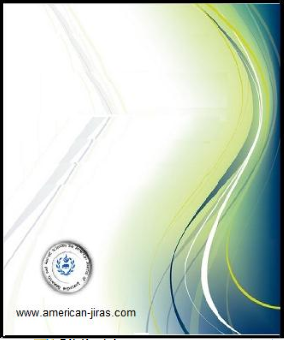
GENERAL INFORMATION
| HOME | ABOUT US | ARCHIVE | AIMS AND SCOP | AUTHORS | REVIEW | SUMIBMIT MANUSCRIPT | EDITORIAL BOARED | PUBLICATION FEE |

| HOME || ABOUT US || ARCHIVES || AIMS AND SCOP || AUTHORS || REVIEW|| SUBMIT MANUSCRIPT || EDITORIAL BOARD |

| Info-AJIRAS-® Journal ISSN 2429-5396 (Online) / Reference CIF/15/0289M |
American Journal of Innovative Research & Applied Sciences

|
American Journal of innovative
Research & Applied Sciences
Research & Applied Sciences
ISSN 2429-5396 (Online)
OCLC Number: 920041286
OCLC Number: 920041286

Authors Contact
*Correspondant author and authors Copyright © 2023:
| GOMOUNG Doloum 1* | KEMSOL NAGORNGAR Angéline 2 | MAOUNDOMBAYE Théophile 3 | TCHAMOGOYE K. B. 1.4 | NGAKOU Albert 4 | et | MBAILAO Mbaiguinam 5 |
Affiliation.
1. Faculté des Sciences et Techniques | Université de Sarh, BP: 105 Sarh | Tchad |
2. Centre National de Recherche pour le Développement | BP: 1228 N’Djamena | Tchad |
3. Faculté des Sciences Exactes et Appliquées | Université de Moundou, BP: 206 Moundou | Tchad |
4. Faculté des Sciences Université de Ngaoundéré | BP: 444, Ngaoundéré | Cameroun |
5. Faculté des Sciences Exactes et Appliquées | Université de N’Djamena | Tchad |
This article is made freely available as part of this journal's Open Access:
| DOI: 10.5281/zenodo.10409442 |
*Correspondant author and authors Copyright © 2023:
| GOMOUNG Doloum 1* | KEMSOL NAGORNGAR Angéline 2 | MAOUNDOMBAYE Théophile 3 | TCHAMOGOYE K. B. 1.4 | NGAKOU Albert 4 | et | MBAILAO Mbaiguinam 5 |
Affiliation.
1. Faculté des Sciences et Techniques | Université de Sarh, BP: 105 Sarh | Tchad |
2. Centre National de Recherche pour le Développement | BP: 1228 N’Djamena | Tchad |
3. Faculté des Sciences Exactes et Appliquées | Université de Moundou, BP: 206 Moundou | Tchad |
4. Faculté des Sciences Université de Ngaoundéré | BP: 444, Ngaoundéré | Cameroun |
5. Faculté des Sciences Exactes et Appliquées | Université de N’Djamena | Tchad |
This article is made freely available as part of this journal's Open Access:
| DOI: 10.5281/zenodo.10409442 |



| ISSN: 2429-5396 (e) | https://www.american-jiras.com | |
| Web Site Form: v 0.1.05 | JF 22 Cours, Wellington le Clairval, Lillebonne | France |
| Web Site Form: v 0.1.05 | JF 22 Cours, Wellington le Clairval, Lillebonne | France |
RESUME
Introduction: Dans le contexte de l'amélioration du rendement agricole et de la promotion d'une agriculture saine et durable en Afrique subsaharienne, en particulier dans la zone soudano-guinéenne du Cameroun et du Tchad, une étude a été entreprise pour évaluer l'efficacité de l'inoculation croisée du soja (Glycine max L.) variété TGX1951-3F avec différentes souches de rhizobia. Objectif: L'objectif principal de cette étude est d'améliorer le rendement du soja en utilisant des biofertilisants rhizobiens dans la zone soudano-guinéenne du Cameroun et du Tchad. Plus spécifiquement, l'étude vise à évaluer l'impact de l'inoculation croisée des biofertilisants rhizobiens sur la croissance et le rendement du soja. Méthodes: Les rhizobia ont été capturés dans les nodules de quatre légumineuses lors des travaux en pots, et l'expérimentation en champ a été réalisée selon un dispositif en bloc complet randomisé avec six traitements distincts (témoin, RA, RN, RS, RV et MR), chaque traitement étant répété trois fois sur les sites de Ngaoundéré et Sarh. Résultats: Les résultats obtenus montrent que les biofertilisants rhizobiens ont significativement amélioré la biomasse sèche de la plante et les rendements à l'hectare. À Ngaoundéré, une augmentation de 9,92% à 55,81% a été observée, tandis qu'à Sarh, une augmentation de 11,57% à 49,53% a été enregistrée par rapport au groupe témoin. Conclusion: En conclusion, l'inoculation croisée des biofertilisants rhizobiens a démontré son efficacité dans l'amélioration du rendement du soja dans la zone soudano-guinéenne du Cameroun et du Tchad. Ces résultats suggèrent que cette approche peut jouer un rôle crucial dans la promotion d'une agriculture plus productive et durable dans la région, offrant ainsi des perspectives encourageantes pour le développement agricole.
Mots-clés : Rhizobia, inoculation croisée, rendement, soja, soudano-guinéenne.
ABSTRACT
Introduction: In the context of improving agricultural yield and promoting sustainable agriculture in sub-Saharan Africa, particularly in the Sudan-Guinea zone of Cameroon and Chad, a study was conducted to assess the effectiveness of cross-inoculation of soybean (Glycine max L.) variety TGX1951-3F with different strains of rhizobia. Objective: The primary objective of this study is to enhance soybean yield by utilizing rhizobial biofertilizers in the Sudan-Guinea zone of Cameroon and Chad. Specifically, the study aims to evaluate the impact of cross-inoculation with rhizobial biofertilizers on the growth and yield of soybeans. Methods: Rhizobia were trapped in the nodules of four legumes during pot experiments, and field experimentation was carried out using a randomized complete block design with six distinct treatments (control, RA, RN, RS, RV, and MR), each repeated three times at the Ngaoundéré and Sarh sites. Results: The results indicate that rhizobial biofertilizers significantly improved the dry biomass of the plant and yields per hectare. In Ngaoundéré, an increase ranging from 9.92% to 55.81% was observed, while in Sarh, an increase from 11.57% to 49.53% was recorded compared to the control group. Conclusion: In conclusion, cross-inoculation with rhizobial biofertilizers has demonstrated its effectiveness in enhancing soybean yield in the Sudan-Guinea zone of Cameroon and Chad. These findings suggest that this approach could play a crucial role in promoting more productive and sustainable agriculture in the region, providing promising prospects for agricultural development.
Keywords: Rhizobia, cross-inoculation, yield, soybean, Sudan-Guinea.
Introduction: Dans le contexte de l'amélioration du rendement agricole et de la promotion d'une agriculture saine et durable en Afrique subsaharienne, en particulier dans la zone soudano-guinéenne du Cameroun et du Tchad, une étude a été entreprise pour évaluer l'efficacité de l'inoculation croisée du soja (Glycine max L.) variété TGX1951-3F avec différentes souches de rhizobia. Objectif: L'objectif principal de cette étude est d'améliorer le rendement du soja en utilisant des biofertilisants rhizobiens dans la zone soudano-guinéenne du Cameroun et du Tchad. Plus spécifiquement, l'étude vise à évaluer l'impact de l'inoculation croisée des biofertilisants rhizobiens sur la croissance et le rendement du soja. Méthodes: Les rhizobia ont été capturés dans les nodules de quatre légumineuses lors des travaux en pots, et l'expérimentation en champ a été réalisée selon un dispositif en bloc complet randomisé avec six traitements distincts (témoin, RA, RN, RS, RV et MR), chaque traitement étant répété trois fois sur les sites de Ngaoundéré et Sarh. Résultats: Les résultats obtenus montrent que les biofertilisants rhizobiens ont significativement amélioré la biomasse sèche de la plante et les rendements à l'hectare. À Ngaoundéré, une augmentation de 9,92% à 55,81% a été observée, tandis qu'à Sarh, une augmentation de 11,57% à 49,53% a été enregistrée par rapport au groupe témoin. Conclusion: En conclusion, l'inoculation croisée des biofertilisants rhizobiens a démontré son efficacité dans l'amélioration du rendement du soja dans la zone soudano-guinéenne du Cameroun et du Tchad. Ces résultats suggèrent que cette approche peut jouer un rôle crucial dans la promotion d'une agriculture plus productive et durable dans la région, offrant ainsi des perspectives encourageantes pour le développement agricole.
Mots-clés : Rhizobia, inoculation croisée, rendement, soja, soudano-guinéenne.
ABSTRACT
Introduction: In the context of improving agricultural yield and promoting sustainable agriculture in sub-Saharan Africa, particularly in the Sudan-Guinea zone of Cameroon and Chad, a study was conducted to assess the effectiveness of cross-inoculation of soybean (Glycine max L.) variety TGX1951-3F with different strains of rhizobia. Objective: The primary objective of this study is to enhance soybean yield by utilizing rhizobial biofertilizers in the Sudan-Guinea zone of Cameroon and Chad. Specifically, the study aims to evaluate the impact of cross-inoculation with rhizobial biofertilizers on the growth and yield of soybeans. Methods: Rhizobia were trapped in the nodules of four legumes during pot experiments, and field experimentation was carried out using a randomized complete block design with six distinct treatments (control, RA, RN, RS, RV, and MR), each repeated three times at the Ngaoundéré and Sarh sites. Results: The results indicate that rhizobial biofertilizers significantly improved the dry biomass of the plant and yields per hectare. In Ngaoundéré, an increase ranging from 9.92% to 55.81% was observed, while in Sarh, an increase from 11.57% to 49.53% was recorded compared to the control group. Conclusion: In conclusion, cross-inoculation with rhizobial biofertilizers has demonstrated its effectiveness in enhancing soybean yield in the Sudan-Guinea zone of Cameroon and Chad. These findings suggest that this approach could play a crucial role in promoting more productive and sustainable agriculture in the region, providing promising prospects for agricultural development.
Keywords: Rhizobia, cross-inoculation, yield, soybean, Sudan-Guinea.
Abstarct7-December-2023

| DECEMBER | VOLUME 17 | ISSUE N° 6 | 2023 |
| ARTICLES | Am. J. innov. res. appl. sci. Volume 17, Issue - 6 Pages 78-84 (December, 2023)
| ARTICLES | Am. J. innov. res. appl. sci. Volume 17, Issue - 6 Pages 78-84 (December, 2023)
Impacts de l'inoculation croisée des Rhizobia sur la productivité du soja dans la région soudano-guinéenne du Tchad et du Cameroun : Une analyse expérimentale
Impacts of Rhizobia cross-inoculation on soybean productivity in the Sudano-Guinean region of Chad and Cameroon: An experimental analysis
| GOMOUNG Doloum 1* | KEMSOL NAGORNGAR Angéline 2 | MAOUNDOMBAYE Théophile 3 | TCHAMOGOYE K. B. 1.4 | NGAKOU Albert 4 | et | MBAILAO Mbaiguinam 5 |. Am. J. innov. res. appl. sci. 2023; 17(6):78-84. doi: 10.5281/zenodo.10409442
| PD FULFL TEXT | | XML FILE | | Abstract and Author Contact | | https://doi.org/10.5281/zenodo.10409442
Impacts of Rhizobia cross-inoculation on soybean productivity in the Sudano-Guinean region of Chad and Cameroon: An experimental analysis
| GOMOUNG Doloum 1* | KEMSOL NAGORNGAR Angéline 2 | MAOUNDOMBAYE Théophile 3 | TCHAMOGOYE K. B. 1.4 | NGAKOU Albert 4 | et | MBAILAO Mbaiguinam 5 |. Am. J. innov. res. appl. sci. 2023; 17(6):78-84. doi: 10.5281/zenodo.10409442
| PD FULFL TEXT | | XML FILE | | Abstract and Author Contact | | https://doi.org/10.5281/zenodo.10409442